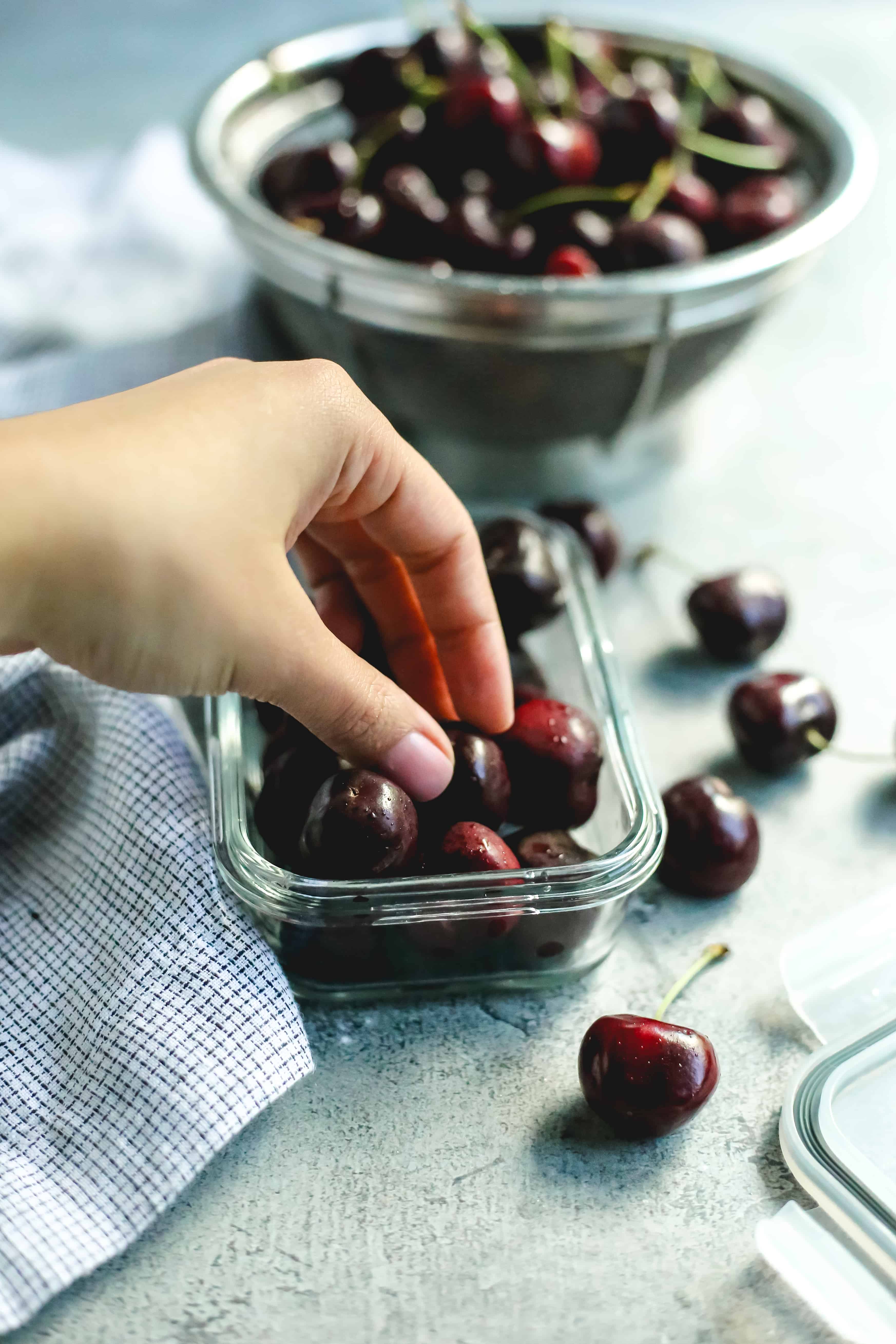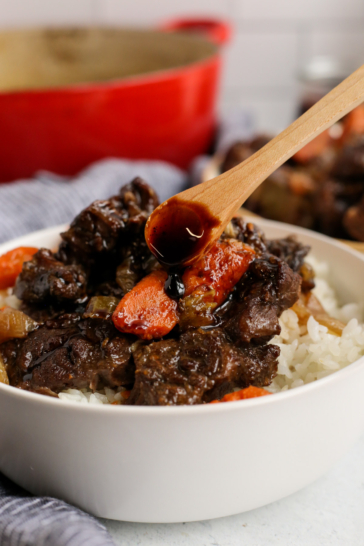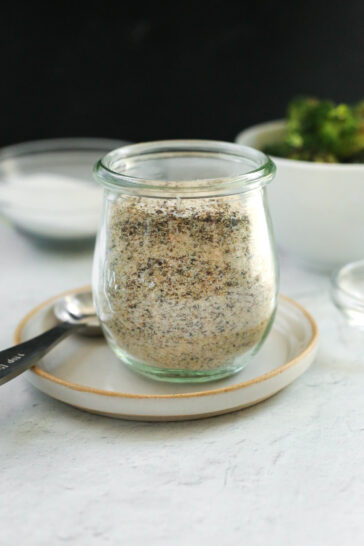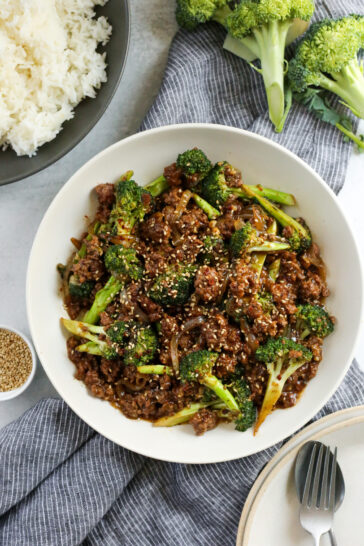Getting enough sleep does so much to support overall health and well-being. But what’s the relationship between nutrition and sleep? Read my top tips for building consistent habits with foods for better sleep to help you sleep better tonight.
At the start of the new year, a lot of people are hyper-focused on weight loss goals. It’s easy to succumb to diet culture and the idea of “new year, new you.” But as an anti-diet dietitian, I’m all for resolutions that don’t have to deal with weight loss or size. Instead, I prefer to focus on where we can build consistent habits that support overall health and well-being. That’s why I want to help you sleep better tonight!
It’s no secret that getting enough sleep can benefit both mental and physical health. Yet, with all the distractions and business of today’s modern world, I see so many clients report they feel sleep-deprived. Research shows a lack of sleep has been associated with poorer health outcomes, including cardiovascular problems [1], a weakened immune system [2], type 2 diabetes [3], impaired thinking and memory [4], and mental health problems such as anxiety and depression [5]. On the flip side, a good night’s sleep can support brain functioning and help with decision-making, creativity, and learning [6,7,8].
So if we know sleep is so important, why do we have such a hard time prioritizing it? Before we start talking about foods for better sleep or the relationship between nutrition and sleep, let’s take a closer look at the sleep-wake cycle in general.
Note: This post is for information only. It’s not intended to provide a diagnosis or treatment plan for sleep disorders, nor can it replace the advice of your healthcare team.
What controls our sleep-wake cycle?
We know that the circadian rhythm is our body’s internal clock, which is primarily influenced by light exposure and other factors. When a person’s sleep-wake cycle is out of whack a person can begin to experience sleep problems such as insomnia. This is part of the reason why shift work can be associated with some of the same health outcomes mentioned above.[9]
Hormones play a major role in this sleep-wake cycle, including melatonin and cortisol, which increase or decrease as part of the circadian rhythm. Melatonin is the hormone that promotes sleepiness and helps us stay asleep at night. When night falls, our bodies begin to make more melatonin. During the day, while exposed to light, our bodies suppress melatonin production and produce cortisol. Cortisol promotes alertness, and our bodies produce more of it in the morning, or when exposed to natural light. Therefore, we know that those who may work night shifts, or sleep during the day, may not be making enough melatonin.
When a person has a disrupted sleep-wake cycle, it can lead to sleep problems when the body’s internal clock is not properly signaling. This can cause issues with falling asleep, frequently waking up in the middle of the night, or waking up earlier than intended. This in turn can cause a shorter amount of time asleep or poorer quality sleep, which can ultimately lead to problems with insomnia or daytime sleepiness.
Relationship Between Nutrition and Sleep
While hormones play a significant role in sleep, we can’t discount the relationship between nutrition and sleep, either. And as helpful as it might be to reach for a supplement when you have trouble falling or staying asleep, I will always stand by the recommendation to strive for more foods that support better sleep whenever possible. There’s a time and a place for supplements, sure, but sourcing key nutrients to support sleep through food can bring other benefits.
Foods for Better Sleep
If you’re trying to sleep better tonight, try incorporating more minerals such as potassium, magnesium, calcium, and iron. These nutrients can help promote the production of melatonin. Here are my top favorite foods that contain these sleep-promoting properties that could help you fall asleep faster and get a better night’s rest:
- Tart Cherries: Studies show that consuming tart cherry juice causes an increase in melatonin production and helps in improving sleep duration and quality. [10]
- Kiwi Fruit: Eating two kiwi fruits one hour before bedtime is believed to promote sleep and enhance sleep quality in those with sleep disorders. [11]
- Dark Chocolate: Dark chocolate contains tryptophan, which stimulates melatonin and serotonin, which promote relaxation.
- Salmon: Fatty fish, like salmon, have been associated with better sleep due to their omega-3 and vitamin D content. In one study, a group of men given salmon three times per week reported significant reductions in the time it took to fall asleep and better overall daily functioning. [12]
- Bananas: Bananas are rich in potassium and magnesium, which promotes relaxation and reduces stress.
- Jasmine Rice: Of all types of rice, jasmine rice is believed to help people fall asleep the fastest. This is because it has a higher glycemic index, which has been shown to boost tryptophan (an amino acid needed to make melatonin) and serotonin (a neurotransmitter that could help support healthier sleeping patterns). [13]
- Nuts: Nuts such as almond or peanut butter are a great bedtime snack because they are loaded with tryptophan and magnesium.
- Oats: While typically a breakfast food, oats before bed are a great way to promote sleep since they trigger insulin production, which makes you feel sleepy. They are also rich in melatonin.
- Dark Leafy Greens: Greens like spinach and kale are packed with calcium, which helps our bodies use tryptophan to produce melatonin.
In addition to these foods for better sleep, the relationship between nutrition and sleep also goes the other way. Foods high in fat, alcohol, caffeine, and gastric irritants, such as acidic or spicy foods, are known to disrupt sleep for some people and may leave you tossing and turning for longer. High-fat foods take longer to digest, and since our bodies start slowing down functions at night to get ready for sleep, we can have a harder time digesting these foods. This can cause a person to experience heartburn or acid reflux, making it harder to fall asleep. If you are having issues with nighttime reflux, I recommend timing your evening snacking to make sure you have fully digested your food before going to bed. If you find yourself hungry before bed try having a small, easy-to-digest snack and make sure you are eating enough during the day.
When should you consider a sleep supplement?
A good night’s rest first and foremost starts with good sleep habits. However, we know this can be easier said than done, and sometimes we may need a little extra help. If you’re experiencing occasional sleeplessness or is struggling with sleep disorders such as insomnia, jet lag, or your circadian rhythm has been thrown off, a sleep supplement may be helpful. The relationship between nutrition and sleep isn’t limited to just foods for better sleep, as supplements can offer targeted doses of some of the same nutrients found in those foods.
Sleep supplements should not be a long-term solution and are only recommended as a way to deal with the occasional problems of falling or staying asleep. It is recommended that someone who has trouble falling asleep pay close attention to their bedtime routine and environment. It’s often called “sleep hygiene” which is just a term used to describe these habits and how you set up your environment and surroundings for sleep. Here’s a simple sleep hygiene checklist that can help you sleep better tonight:
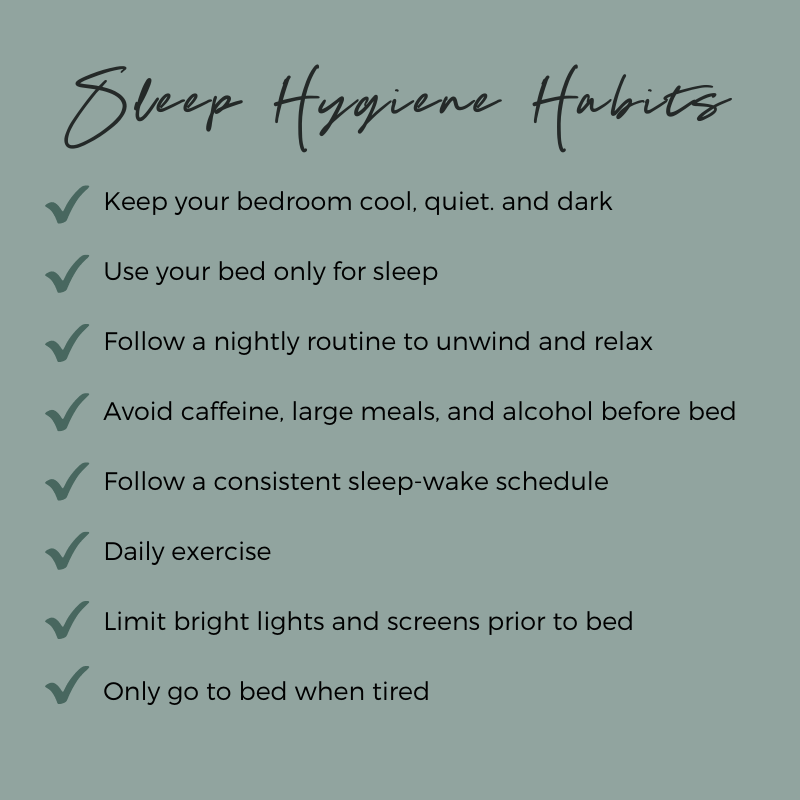
If you have implemented these changes and still find you are experiencing trouble sleeping, it’s best to seek help from a doctor or medical provider to help you find a more long-term solution. They may refer you to a sleep clinic or sleep specialist for further assessment and support.
Street Smart Nutrition Tip: Always check with your doctor before starting any new supplements or sleep aids, and stop taking them immediately if you notice any adverse changes in your health. Always seek the advice of your doctor or a qualified medical provider with any questions you may have regarding a medical condition. If you’re working with a dietitian, it’s also a good idea to let them know about these changes in case there are food-drug or food-supplement interactions to watch out for.
Bottom Line: There is not enough research to know how sleep aids affect sleep in most people. While most sleep supplements use low (less than 5 mg) doses of melatonin and are safe, the use of supplements can cause issues such as allergic reactions, adverse side effects like GI symptoms or headaches, excessive sleepiness, grogginess, and drug interactions. The short-term use of natural sleep aids is considered safe for most children, however, there is limited research around long-term use. Also, pregnant women and women who are breastfeeding should use caution with natural sleep aids since little is known about the potential side effects.
What are common ingredients in a sleep supplement, and how do they work?
The relationship between nutrition and sleep is still being researched, and as we learn more, the recommended doses and safety information may change. But at this point in time, this non-inclusive list represents some of the most commonly used ingredients in sleep supplements. Here are some common ingredients to look for:
- Melatonin: Melatonin is a hormone our body produces naturally. In the evening, body levels rise to promote sleep and let the body know it’s time for bed. The use of melatonin may help reduce the time needed to fall asleep and increase total sleep time. [14]
- GABA: GABA is a chemical made in the brain that helps regulate brain function. Studies have found that GABA supplementation can induce relaxation and reduce anxiety. [15]
- Magnesium: It is believed magnesium may help regulate neurotransmitters in our body that are related to sleep and other important body functions. It is known to help the body feel calm and relaxed. Research has shown it can help with insomnia and improve sleep quality. [16]
- L-Theanine: L-theanine is thought to promote relaxation in the mind and help with anxiety and stress relief. Recent studies have shown it may potentially improve sleep. [17]
- Passionflower: This herbal remedy is used today for its calming effects to treat anxiety and insomnia. Passionflower is thought to increase levels of GABA in the brain. Studies have reported the consumption of passionflower can have sleep benefits for those experiencing fluctuations in sleep quality. [18]
- Valerian Root: Research suggests valerian root may improve sleep quality when taken right before bed. [19]
The relationship between nutrition and sleep is still being researched, and as we learn more, the recommended doses and safety information may change. But at this point in time, this non-inclusive list represents some of the most commonly used ingredients in sleep supplements.
Note: Dietary supplements are regulated differently than food and drugs, which are overseen by the FDA (Food & Drug Administration). To ensure you’re getting a high-quality and safe supplement, check for a third-party certification (like the NSF label) before buying. And remember that “more expensive” doesn’t always translate to “better quality” or “more effective”.
Other Tips to Sleep Better Tonight
Beyond foods for better sleep and supplements, there are plenty of other ways to help prioritize and support better sleep tonight:
- Keep a consistent sleep schedule. Do your best to go to bed and wake up at the same time every day, even on the weekends.
- Prioritize a good night’s rest by building in enough time in your schedule to make this a daily habit. Work backward from your fixed wake-up time and select a target bedtime that allows for 7-9 hours of sleep a night.
- Create an environment that is ideal for sleeping. This involves making sure your bedroom is quiet, dark, and cool.
- “Wind-down” about 30 minutes before bed. Build a relaxing bedtime routine with calming practices such as dimming the lights, listening to soothing music, taking a warm bath, meditating, or reading. Find what makes you feel the most relaxed and stick with it! This will help get you in the right mindset to cue your body that it’s time to sleep.
- Get a dose of natural sunlight first thing in the morning and limit exposure to bright light in the evening. This will help normalize your circadian rhythm. Avoid electronics and screens at least 30 minutes before bed. Blue light is believed to reduce melatonin production, telling your brain it’s time to be awake.
- Each person’s sensitivity to caffeine varies, but it is recommended to avoid caffeine later in the day since it can make it more difficult to fall asleep.
- Regular exercise is known to help improve sleep quality – just avoid exercising too close to bedtime since it raises the core body temperature and increases heart rate, which may make it harder to fall asleep.
- Try to manage stress and anxiety before attempting to fall asleep. If something is on your mind or causing you stress, keep a journal next to your bed and try writing down your worries to get them out of your head and prevent them from keeping you up at night.
If you are interested in learning more tips for building consistent self-care practices using foods, check out this post: The Key to Self-Care is Consistency: Three Tips to Make Healthy Habits Stick.
Special thanks and author credit to Kristen Nicolai for her support with the writing, citations, and design for this post.
References
- Miller, M. A., & Cappuccio, F. P. (2007). Inflammation, sleep, obesity and cardiovascular disease. Current vascular pharmacology, 5(2), 93–102.https://doi.org/10.2174/157016107780368280
- Del Gallo, F., Opp, M. R., & Imeri, L. (2014). The reciprocal link between sleep and immune responses. Archives italiennes de biologie, 152(2-3), 93–102.https://doi.org/10.12871/000298292014234
- Cappuccio, F. P., D’Elia, L., Strazzullo, P., & Miller, M. A. (2010). Quantity and quality of sleep and incidence of type 2 diabetes: a systematic review and meta-analysis. Diabetes care, 33(2), 414–420.https://doi.org/10.2337/dc09-1124
- Sara, S. J. (2017). Sleep to Remember. Journal of Neuroscience, 37(3), 457–463. https://doi.org/10.1523/JNEUROSCI.0297-16.2017
- Mental Health and Sleep. (2020, September 18). Sleep Foundation. https://www.sleepfoundation.org/mental-health
- Okano, K., Kaczmarzyk, J. R., Dave, N., Gabrieli, J. D. E., & Grossman, J. C. (2019). Sleep quality, duration, and consistency are associated with better academic performance in college students. Npj Science of Learning, 4(1), 1–5. https://doi.org/10.1038/s41539-019-0055-z
- Whitney, P., Hinson, J. M., Jackson, M. L., & Van Dongen, H. P. A. (2015). Feedback Blunting: Total Sleep Deprivation Impairs Decision Making that Requires Updating Based on Feedback. Sleep, 38(5), 745–754. https://doi.org/10.5665/sleep.4668
- Lewis, P. A., Knoblich, G., & Poe, G. (2018). How Memory Replay in Sleep Boosts Creative Problem-Solving. Trends in Cognitive Sciences, 22(6), 491–503. https://doi.org/10.1016/j.tics.2018.03.009
- Costa, G. (2010). Shift Work and Health: Current Problems and Preventive Actions. Safety and Health at Work, 1(2), 112–123. https://doi.org/10.5491/SHAW.2010.1.2.112
- Howatson, G., Bell, P. G., Tallent, J., Middleton, B., McHugh, M. P., & Ellis, J. (2012). Effect of tart cherry juice (Prunus cerasus) on melatonin levels and enhanced sleep quality. European journal of nutrition, 51(8), 909–916. https://doi.org/10.1007/s00394-011-0263-7
- Lin, H. H., Tsai, P. S., Fang, S. C., & Liu, J. F. (2011). Effect of kiwifruit consumption on sleep quality in adults with sleep problems. Asia Pacific journal of clinical nutrition, 20(2), 169–174.
- Hansen, A. L., Dahl, L., Olson, G., Thornton, D., Graff, I. E., Frøyland, L., Thayer, J. F., & Pallesen, S. (2014). Fish consumption, sleep, daily functioning, and heart rate variability. Journal of clinical sleep medicine : JCSM : official publication of the American Academy of Sleep Medicine, 10(5), 567–575. https://doi.org/10.5664/jcsm.3714
- Afaghi, A., O’Connor, H., & Chow, C. M. (2007). High-glycemic-index carbohydrate meals shorten sleep onset. The American journal of clinical nutrition, 85(2), 426–430. https://doi.org.edu/10.1093/ajcn/85.2.426
- Zizhen Xie, Fei Chen, William A. Li, Xiaokun Geng, Changhong Li, Xiaomei Meng, Yan Feng, Wei Liu & Fengchun Yu (2017) A review of sleep disorders and melatonin, Neurological Research, 39:6, 559-565, DOI: 10.1080/01616412.2017.1315864
- Abdou, A.M., Higashiguchi, S., Horie, K., Kim, M., Hatta, H. and Yokogoshi, H. (2006), Relaxation and immunity enhancement effects of γ-Aminobutyric acid (GABA) administration in humans. BioFactors, 26: 201-208. DOI: DOI: 10.1002/biof.5520260305
- Abbasi, B., Kimiagar, M., Sadeghniiat, K., Shirazi, M. M., Hedayati, M., & Rashidkhani, B. (2012). The effect of magnesium supplementation on primary insomnia in elderly: A double-blind placebo-controlled clinical trial. Journal of research in medical sciences : the official journal of Isfahan University of Medical Sciences, 17(12), 1161–1169.
- Williams J, Kellett J, Roach PD, McKune A, Mellor D, Thomas J, Naumovski N. l-Theanine as a Functional Food Additive: Its Role in Disease Prevention and Health Promotion. Beverages. 2016; 2(2):13. https://doi.org/10.3390/beverages2020013
- Ngan, A., & Conduit, R. (2011). A double-blind, placebo-controlled investigation of the effects of Passiflora incarnata (passionflower) herbal tea on subjective sleep quality. Phytotherapy research : PTR, 25(8), 1153–1159. https://pubmed.ncbi.nlm.nih.gov/21294203/
- Bent S., Padula A., Moore D., Patterson M., Mehling W. Valerian for sleep: A systematic review and meta-analysis. Am. J. Med. 2006;119:1005–1012. doi: 10.1016/j.amjmed.2006.02.026.
